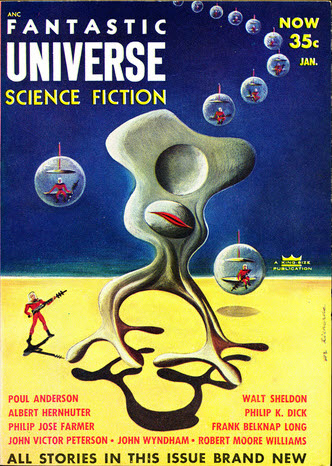|
The Sensitive Man
"The Sensitive Man" is a science fiction novella by American writer Poul Anderson, first published in the January 1954 issue of ''Fantastic Universe'' and reprinted in the 1981 collection ''The Psychotechnic League''. The story is a component of the Psychotechnic League future history, and takes place in the year 2009, between "Un-Man" and "The Big Rain". Plot summary Michael Tighe of the Psychotechnic Institute has been kidnapped by Thomas Bancroft, a politician with ties to an authoritarian movement called the Actionists. Tighe's adopted son, Simon Delgatty, sets out to find him, but is himself captured by Bancroft and taken to his base on an island off the coast of Mexico. In the course of raising Delgatty, Tighe has trained him to exert conscious control over what are normally subconscious and autonomic brain functions. This allows Delgatty to speed up or slow down his metabolism at will, and also allows him to tell what other people are thinking by listening to them subv ... [...More Info...] [...Related Items...] OR: [Wikipedia] [Google] [Baidu] |
Poul Anderson
Poul William Anderson (November 25, 1926 – July 31, 2001) was an American fantasy and science fiction author who was active from the 1940s until the 21st century. Anderson wrote also historical novels. His awards include seven Hugo Awards and three Nebula Awards. Biography Poul Anderson was born on November 25, 1926, in Bristol, Pennsylvania to Scandinavian parents. Soon after his birth, his father, Anton Anderson relocated the family to Texas, where they lived for more than ten years. After Anton Anderson's death, his widow took the children to Denmark. The family returned to the United States after the beginning of World War II, settling eventually on a Minnesota farm. While he was an undergraduate student at the University of Minnesota, Anderson's first stories were published by editor John W. Campbell in the magazine ''Astounding Science Fiction'': "Tomorrow's Children" by Anderson and F. N. Waldrop in March 1947 and a sequel, "Chain of Logic" by Anderson alone, in July ... [...More Info...] [...Related Items...] OR: [Wikipedia] [Google] [Baidu] |
The Psychotechnic League
The Psychotechnic League is a future history created by American science fiction writer Poul Anderson. The name "Psychotechnic League" was invented by Sandra Miesel during the early 1980s, to capitalize on Anderson's better-known Polesotechnic League future history. Anderson published 21 novels, novellas and short stories set in this future between 1949 and 1957, with a 22nd published in 1968. Anderson did not write the stories in chronological order. He included a series timeline in the Winter 1955 issue of'' Startling Stories ''to accompany the novella "The Snows of Ganymede". By the late 1950s, Anderson's political beliefs had altered to the extent that he was uncomfortable with the political philosophy implied by the series, and he abandoned it. In particular, he had reversed his earlier strong endorsement for the United Nations as the basis of a world government, an opinion which was the main plot element of several earlier stories in the series. Psychotechnic League ... [...More Info...] [...Related Items...] OR: [Wikipedia] [Google] [Baidu] |
Novellas By Poul Anderson
A novella is a narrative prose fiction whose length is shorter than most novels, but longer than most short stories. The English word ''novella'' derives from the Italian ''novella'' meaning a short story related to true (or apparently so) facts. Definition The Italian term is a feminine of ''novello'', which means ''new'', similarly to the English word ''news''. Merriam-Webster defines a novella as "a work of fiction intermediate in length and complexity between a short story and a novel". No official definition exists regarding the number of pages or words necessary for a story to be considered a novella, a short story or a novel. The Science Fiction and Fantasy Writers Association defines a novella's word count to be between 17,500 and 40,000 words. History The novella as a literary genre began developing in the Italian literature of the early Renaissance, principally Giovanni Boccaccio, author of ''The Decameron'' (1353). ''The Decameron'' featured 100 tales (named nove ... [...More Info...] [...Related Items...] OR: [Wikipedia] [Google] [Baidu] |

